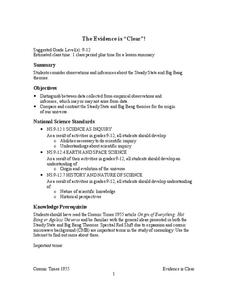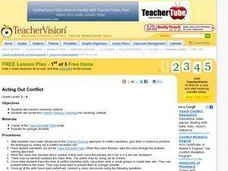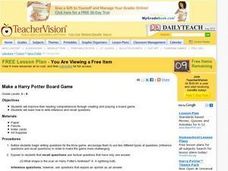NASA
The Evidence is “Clear”!
Do you think you know better? Become a scientist and prove it. Scholars review the evidence for two different theories of the origins of the universe. They notice the empirical observations as well as the inferences to determine which is...
NASA
Measuring Dark Energy
You're only 10 minutes late? Do you know how much the universe has expanded in those 10 minutes? Scholars graph supernovae based on their redshift and see if the results verify Hubble's Law. If it does confirm it, the universe is...
Museum of Tolerance
And Justice for All? Slavery Not Just in the Past
Slavery in India, Sudan, and Mauritania? What about in the United States? Groups research modern slavery in these four countries, collecting factual evidence (What), determine their feelings about this evidence (So what), and consider...
National External Diploma Program Council
Capitalization Review
Using correct grammar is a capital idea! Elementary readers review the rules of capitalization, including proper nouns, abbreviations of organizations, and holidays, before correcting the errors in two sets of sentences.
PHET
Science and Engineering Conference
Young scientists present their experimental designs from the previous experiment. The ninth lesson in the series outlines what learners should present, what class discussions should happen, and the solution NASA came up with for the same...
PHET
Iron Filings and Magnetic Field Lines
How do magnetic fields differ? Allow scholars to see the difference between 2-D and 3-D magnetic fields. They construct models of both and observe how they are similar and different. It is the fifth installment of an 18-part unit.
Messenger Education
Give Me a Boost—How Gravity Assists Aid Space Exploration
The propellant needed for space explorations runs in the thousands, while paying to get the craft into orbit costs millions! In the second installment of three, two activities explore laws of conservation of energy and momentum. Using...
Intel
Energy Innovations
Collaborative groups examine the importance of energy resources on quality of life by researching different energy sources and alternative energy sources through data analysis. They make a comparison of different countries and cultures,...
AAAS
Identification and Classification of Grassland Plants
Take learning outside and start classifying grasslands. Young ecologists observe grassland plants in order to classify them into the appropriate species by family. They note their characteristics and where they grow. A true field...
Polar Trec
Beacon Valley Weather
In Beacon Valley, katabatic winds regularly knock fit adults to the ground. The lesson compares the actual temperatures to the wind chill after factoring in katabatic winds in Beacon Valley. Scholars learn to calculate wind chill and...
Lee & Low Books
Classroom Guide for Sacred Mountain: Everest
The most famous climbers of Mount Everest could never have made it to the summit without the assistance of the local Sherpa. Christine Taylor-Butler's nonfiction children's book Sacred Mountain: Everest is the focus of an extensive...
American Museum of Natural History
Going, Going...Gone?
Young environmentalists consider how scientists are attempting to save endangered species. They read about what causes extinction and steps to take to minimize the threats.
American Museum of Natural History
Fascinating Fish
A fish is not just a fish. So many fish in remote places have unique characteristics. Take a trip with an ichthyologist to the Congo River to discover the species of one of the most diverse fish populations in the world. The online...
American Museum of Natural History
Saving Species
Some scientists dedicate their lives to researching and protecting endangered species. An online lesson teaches about three scientists around the world who do just that. They learn about spiders, mollusks, and reptiles from North...
American Museum of Natural History
Finding Fossils
How does one go about finding fossils? Find out with an informative webpage that looks at the digging process, showcases rocks and common fossils, helpful tips, and a list of archeological do's and don'ts.
Workforce Solutions
A Colony for Lunar Living
Two lessons explore the possibility of living on the moon. First, scholars read various scenarios to identify which careers would best transfer to life in space. Finally, pupils examine a website to locate items made for outer space,...
Curated OER
Investigation 6 - Dinosaur Extinction
Fourth graders research and analyze theories on why dinosaurs became extinct. They need to find clues as to what the cause may have been. They record the evidence that they find to support their theory on the Dinosaur Extinction Theory...
Curated OER
Relative Dating - Telling Time Using Fossils
Students use fossil range charts to explain relative dating. They graph for ammonites, marine organisms that went extinct at the same time as dinosaurs.
Curated OER
Floods: Rising Waters and You
Students examine the relationship between human-made structures, flood waters and the increasing population through video clips, websites and a lab experiment.
Curated OER
Volcanoes:How Safe Are They?
Young scholars explore volcanoes, locate them on maps, record general information about volcanoes, and organize information on a fact sheet.
Curated OER
Acting Out Conflict
Learners practice solving given conflicts. They act out different scenerios and decide on the best one. They discuss questions to end the lesson.
Curated OER
Make a Harry Potter Board Game
Students, in groups, make a Harry Potter Board Game. They explore how to write inference and recall questions.
Curated OER
Team Teaching - Spanish
Students present a Spanish grammar topic to the class. In pairs, they select and research a grammar concept, create an over-head transparency, homework assignment, and a quiz to use with the presentation, and teach their concept to the...
Curated OER
Election Vocabulary Brainstorm
Learners participate in numerous activities pertaining to elections. They study election vocabulary and generate questions about campaigns and elections. They paraphrase articles and generate a class vocabulary list.
Other popular searches
- Earth History
- Earth's History
- Earth History Activities
- Layers of Earth History
- Earth History Timeline
- Earths Geologic History
- Earth History Soil
- Earth History Review
- Earth History Time Line
- Earths History
- Moon and Earth History
- Ancient Life on Earth

























